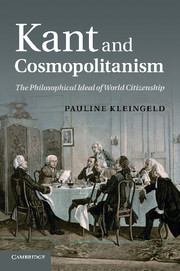Book contents
- Frontmatter
- Contents
- Acknowledgments
- Abbreviations and main primary texts
- Introduction
- Chapter 1 Kant and Wieland on moral cosmopolitanism and patriotism
- Chapter 2 Kant and Cloots on global peace
- Chapter 3 Kant’s concept of cosmopolitan right
- Chapter 4 Kant and Forster on race, culture, and cosmopolitanism
- Chapter 5 Kant and Hegewisch on the freedom of international trade
- Chapter 6 Kant and Novalis on the development of a cosmopolitan community
- Chapter 7 Kant’s cosmopolitanism and current philosophical debates
- Bibliography
- Index
Chapter 5 - Kant and Hegewisch on the freedom of international trade
Published online by Cambridge University Press: 05 November 2011
- Frontmatter
- Contents
- Acknowledgments
- Abbreviations and main primary texts
- Introduction
- Chapter 1 Kant and Wieland on moral cosmopolitanism and patriotism
- Chapter 2 Kant and Cloots on global peace
- Chapter 3 Kant’s concept of cosmopolitan right
- Chapter 4 Kant and Forster on race, culture, and cosmopolitanism
- Chapter 5 Kant and Hegewisch on the freedom of international trade
- Chapter 6 Kant and Novalis on the development of a cosmopolitan community
- Chapter 7 Kant’s cosmopolitanism and current philosophical debates
- Bibliography
- Index
Summary
Introduction
In 1792, two centuries before “globalization” became a buzzword, Dietrich Hermann Hegewisch (1746–1812), a well-respected professor at the University of Kiel, argued that the world-wide economic market should be turned into a sphere of free trade. This, he claimed, would raise everyone’s standard of living, enhance individual freedom and general happiness, reduce the role of individual states and their governments, and promote a world-wide peace by establishing lively commerce and brotherhood among all humans on earth. As a step on the path toward this larger goal, he argued, Europeans should introduce a common monetary standard.
Hegewisch is a forgotten figure with a surprisingly interesting version of free-market cosmopolitanism. He was one of the first German-language authors – perhaps even the very first – to engage productively with Adam Smith’s Inquiry into the Nature and Causes of the Wealth of Nations, several years before Smith is usually believed to have entered the German discussion. Criticizing Smith and going beyond him, he developed a distinctive form of free-market cosmopolitanism.
- Type
- Chapter
- Information
- Kant and CosmopolitanismThe Philosophical Ideal of World Citizenship, pp. 124 - 148Publisher: Cambridge University PressPrint publication year: 2011



